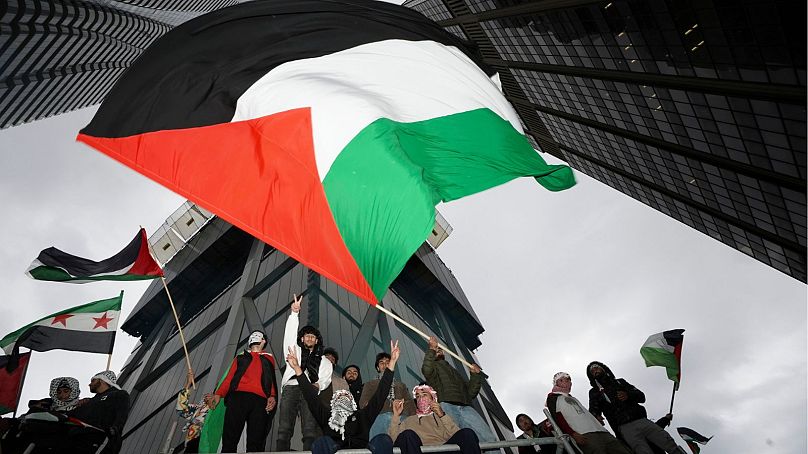China, Russia and Iran are profiting from the information chaos around the Israel-Hamas war to advance their own geopolitical agenda, a report finds.
Chinese, Russian and Iranian state agents are using the information chaos surrounding the Israel-Hamas war to their advantage, glorifying violence, promoting hate, and helping to spread false claims on what’s happening on the ground in the Middle East, according to a new report.
 ADVERTISEMENT
ADVERTISEMENT
 ADVERTISEMENT
ADVERTISEMENT
The war between Israel and the Palestinian militant group has led to a surge in misinformation online, especially on social media, as well as a sudden increase in hate and violent speech, both anti-Semitic and Islamophobic.
A new study by researchers at the UK-based Institute for Strategic Dialogue (ISD), which monitors the spread of extremism and misinformation online, found that agents like China, Russia and Iran are exploiting the crisis to advance their geopolitical agenda.
The British think tank collected data from hundreds of Facebook and X (formerly Twitter) accounts belonging to Iranian, Russian and Chinese officials, diplomatic representations and state media between 7 and 18 October, right after Hamas’ surprise attack on Israel.
It found that the three countries are using the information chaos around the war in different ways according to their interests.
Iranian state-affiliated accounts have been glorifying the Hamas attack on 7 October as a “strategic blow against Israel” and accusing the US of being responsible for Palestinian suffering. They have also glorified and excused war crimes against Israeli civilians and used dehumanising language, as well as sharing unverified clips that were later proven to be false.
Russian state-affiliated accounts, on the other hand, have been using the conflict to push an anti-Western and anti-Ukrainian narrative that Moscow has been promoting for months now - if not years.
Russian state media have also contributed to spreading false and unverified information, claiming Ukraine had supplied weapons to Hamas and that Hamas had even publicly thanked Kyiv for the alleged help. Russian state media also wrote that the Gaza City hospital destroyed on 17 October was hit by a bomb supplied to Israel by the US.
It’s not yet clear who was behind the deadly blast on the al-Ahli Hospital, where hundreds of civilians are estimated to have lost their lives. Both Israel and the Palestinian Islamic Jihad - accused by Israeli authorities of being responsible for the strike - denied having any role in the blast.
Accounts affiliated with the ruling Chinese Communist Party (CCP) changed their approach to the war according to the platform they use, according to the ISD report.
“While posts on Facebook remained neutral, insisting on condemning all acts that harm civilians, Chinese state media accounts on X denounced the US for supposedly seeking economic advantage from the escalation”, the report reads.
“These same accounts called out Western politicians and mainstream media for turning ‘a blind eye’ to the victims in Gaza.”
“It may not come as a surprise that authoritarian states are trying to exploit the confusion around the Israel-Hamas conflict to advance their own geopolitical agenda”, said ISD’s Senior Analyst Julia Smirnova.
“But we - and especially social media platforms - shouldn’t overlook the harms of this rhetoric in exacerbating polarisation and deepening mistrust towards democratic institutions and the media.”











